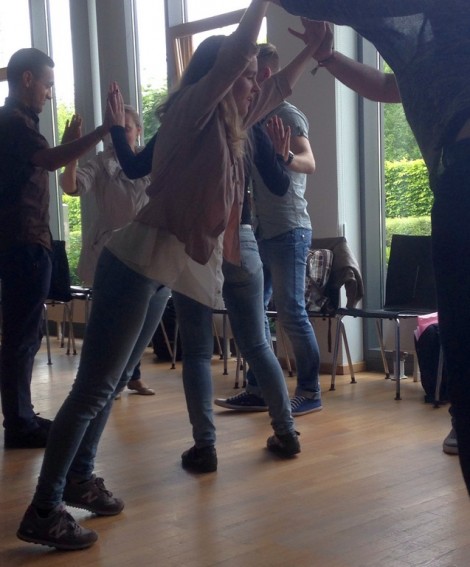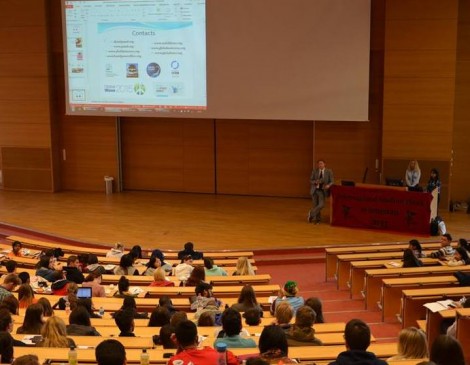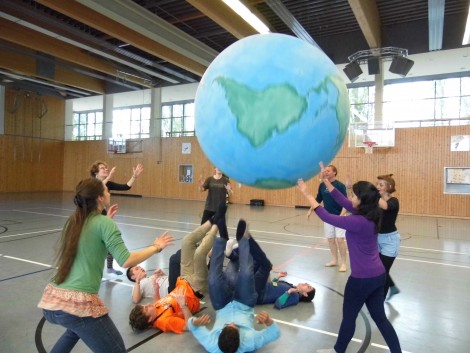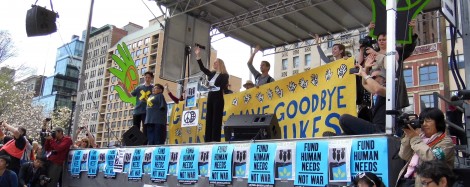‘The fact that we have not destroyed the world yet with nuclear weapons is indeed a miracle of good luck that cannot last forever’, announced policy expert Alyn Ware from Aotearoa Lawyers for Peace and the Basel Peace Office, the opening keynote speaker for the International Students Week in Ilmenau on May 30. ‘If we don’t abolish nuclear weapons, they will likely abolish us.’
‘On at least 20 times we have nearly had a nuclear war by accident, miscalculation or conflict escalation,’ he said, before showing 5 minutes of ‘The Man who Saved the World,’ the award-winning film about one of those times.
Over 300 university students from 70 countries were gathered at the Technical University of Ilmenau for 10 days to explore key issues facing humanity, and the responsibility of youth to act effectively to address these issues.

ISWI students practicising cooperation and trust-building, something vital for nuclear abolition
The first issue on the agenda – nuclear disarmament – was by no means the easiest to deal with. The horrific human and health consequences of the testing, production and use of nuclear weapons, which Mr Ware outlined in his presentation, were well recognized by the students, as was the exorbitant nuclear weapons budget (over $100 billion annually) that is sorely needed for other social and economic needs.
On the other hand, the fact that nuclear weapons have not been used in wartime since 1945 breeds complacency about the risks of such use. More significantly, some students suggested that nuclear deterrence can prevent war and protect countries against aggression. Indeed some students from Libya and Ukraine questioned whether it was wise for their countries to have given up their nuclear weapons program (Libya) or the nuclear weapons on their territory (Ukraine) – as, subsequent to doing so, they have both experienced military invasion.

Mr Ware, Ms Velikanova and Ms Swani presenting to the ISWI conference
Mr Ware offered a range of alternatives to nuclear deterrence for dealing with nuclear-related conflicts and for preventing aggression or the threat of aggression. These included diplomacy (as is now working in the case of Iran’s nuclear program), the use of international treaty regimes (the Chemical Weapons Convention regime was used to get rid of Syria’s chemical weapons) and the use of the International Court of Justice, Good Offices of the United Nations Secretary-General and UN Security Council. Mr Ware gave examples of success for all of these approaches and outlined UNFOLD ZERO, a platform which highlights the possibilities for cooperative security and the elimination of nuclear weapons through a range of United Nations mechanisms, forums and initiatives.
However, there still remained amongst some students, a lack of confidence that these mechanisms and approaches could get the world out of the nuclear prisoner’s dilemma in which we are now. The prisoner’s dilemma is a situation where two separate parties have a choice to cooperate or compete. There are three possible outcomes – win/win, win/lose and lose/lose. The dilemma is that only if both cooperate is there win/win. If one chooses to compete and the other to cooperate, the one choosing to compete wins while the one choosing to cooperate loses. The temptation for both is therefore to compete, so that they don’t get ‘beaten’ by the other side, but in making this choice they both lose…

The nuclear prisoners’ dilemma
The prisoner’s dilemma, applied to nuclear weapons, explains why States will mutually pursue nuclear weapons – a lose/lose outcome- despite the risks and opportunity costs, unless there is an effective third party to facilitate and enforce nuclear disarmament – a win/win outcome. The UNFOLD ZERO platform suggests that the United Nations could play this role.
Basel Peace Office, followed up the opening presentation with a series of workshops, co-facilitated by the Youth Future Project, on alternative security, nuclear disarmament and cooperation. In one of these workshops students were put into a prisoners’ dilemma situation and challenged to break through the barriers to achieving win/win (cooperative) security. In other workshops, students were challenged to build trust and cooperation through a variety of games including with a 1.8 metre diameter Earth ball (see Sports Peace Games for descriptions of these and other games).

Earthball games at the ISWI conference
But back to some other highlights of the opening 2-hour presentation on May 30:
Ms. Rimma Velikanova, a young intern at the Basel Peace Office, reported on the successful Global Wave 2015 Campaign that she organized. The action involved creative ‘waves goodbye to nuclear weapons’ just prior to the 2015 NPT Review Conference, 4-week long United Nations conference on nuclear non-proliferation and disarmament. Over the course of 24 hours, a wave of over 100 creative nuclear abolition actions swept around the world.
There were ‘waves goodbye to nuclear weapons’ at schools & universities, homes & workplaces, city halls & parliaments, places of worship & interfaith gatherings, peace monuments & museums, at music festivals & sports events, nuclear weapons deployment sites & production facilities, at conferences and special anniversary events. See Global Wave 2015 video of people around the world waving goodbye to nuclear weapons.
Then, as the foreign ministers and other representatives of the governments spoke at the UN, many of them giving excuses for holding onto nuclear weapons, Global Wave 2015 tweeted videos and photos of Global Wave actions in their countries.

Rimma launching the Global Wave at the Peace and Planet rally in New York
Ms. Simrat Swani, another student interning at the Basel Peace Office, spoke about Global Zero, a non-partisan group of high-level former officials supported by a network of university chapters. Global Zero’s vision is for a nuclear free world by 2030. The emphasis was laid on student-led campaigns such as ‘Tour the Bomb’ and ‘Valentines Day: Break Up With Nukes’ organized as a part of Global Zero India.
The presentation was facilitated by two videos. Zero nukes by 2030 narrated by Michael Douglas and Global Zero video: The World must stand together with President Obama and Hollywood stars calling for nuclear abolition.
Many of the students attending the presentation and workshops expressed interest in joining global youth actions on nuclear abolition including those planned for the International Day for the Total Elimination of Nuclear Weapons on September 26.
Written by Alyn Ware for Basel Peace Office
